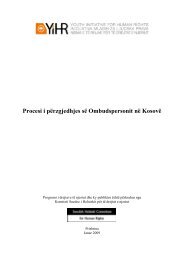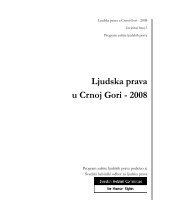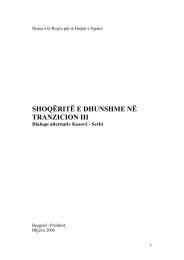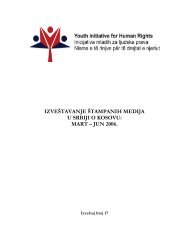Implementation of Transitional Laws in Serbia 2006
Implementation of Transitional Laws in Serbia 2006 - Archive
Implementation of Transitional Laws in Serbia 2006 - Archive
- No tags were found...
Create successful ePaper yourself
Turn your PDF publications into a flip-book with our unique Google optimized e-Paper software.
<strong>Implementation</strong> <strong>of</strong> <strong>Transitional</strong> <strong>Laws</strong> <strong>in</strong> <strong>Serbia</strong> <strong>2006</strong>has been the previous practice <strong>of</strong> the M<strong>in</strong>istry <strong>of</strong> Internal Affairs.• The tra<strong>in</strong><strong>in</strong>g <strong>of</strong> personnel <strong>in</strong> the organs <strong>of</strong> public authorities whichdeal or will deal with the implementation <strong>of</strong> this law must beapproached more seriously and more persistently• It is necessary to precisely def<strong>in</strong>e by the law whether the salaries <strong>of</strong>managers and members <strong>of</strong> adm<strong>in</strong>istrative and supervis<strong>in</strong>g boards<strong>of</strong> the public firms represent <strong>in</strong>formation which should not beavailable to the public. It happens <strong>in</strong> practice that some public firmsallow access to these <strong>in</strong>formation, and some do not.• In order to make the work <strong>of</strong> the Commissioner and his <strong>of</strong>ficebetter, additional support <strong>of</strong> the authorized organs <strong>in</strong> the form <strong>of</strong>employment <strong>of</strong> new personnel and the secur<strong>in</strong>g <strong>of</strong> a new, largerwork<strong>in</strong>g space is needed.• Paragraph 1 <strong>of</strong> the Article 2 <strong>of</strong> the Constitutional law should beerased.Law on the Protector <strong>of</strong> CitizensUpon the suggestion <strong>of</strong> the Government <strong>of</strong> the Republic <strong>of</strong> <strong>Serbia</strong>, Lawon the Protector <strong>of</strong> citizens 356 was adopted <strong>in</strong> the National Assembly <strong>of</strong> theRepublic <strong>of</strong> <strong>Serbia</strong> on September 16th 2005, and it took effect on September24th 2005. The law derives its name from Swedish word “ombudsman”mean<strong>in</strong>g a representative, advocate or confidant. This democratic <strong>in</strong>stitutionhas a long-stand<strong>in</strong>g tradition and was first <strong>in</strong>troduced <strong>in</strong> Sweden <strong>in</strong> 1809.As for the <strong>Serbia</strong>, the concept <strong>of</strong> ombudsman exists <strong>in</strong> autonomous region<strong>of</strong> Vojvod<strong>in</strong>a and local self-govern<strong>in</strong>g bodies. Though each municipalityhas right to decide upon a local, municipal ombudsmen, there are noprecise data on the number <strong>of</strong> local bodies which have made use <strong>of</strong> such apossibility <strong>in</strong> their citizens’ best <strong>in</strong>terest. It is <strong>in</strong>terest<strong>in</strong>g that the lawmakeropted for the phrase “protector <strong>of</strong> citizens”, though <strong>in</strong> Vojvod<strong>in</strong>a the word“ombudsman” is used, whereas <strong>in</strong> local self-govern<strong>in</strong>g bodies the alternativeterm “ombudsman” or “citizens’ advocate” has been <strong>in</strong>troduced. In Austriaand Macedonia the term “defender <strong>of</strong> citizens’ rights” can be met. <strong>Serbia</strong>was amongst the last European countries to <strong>in</strong>troduce this concept.356 Law on the Protector <strong>of</strong> citizens; see above under 581











